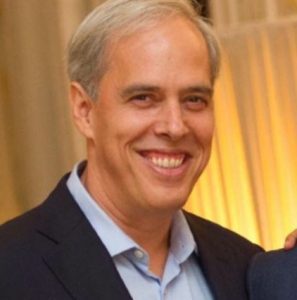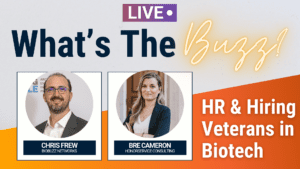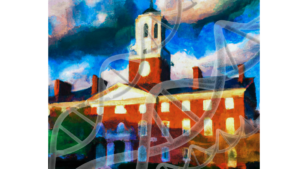
5 Questions With Taylor Sullivan, Social Media Marketing Manager for Looks Like Me Books and Budding Entrepreneur
“5 Questions With…” is a recurring BioBuzz series where we reach out to interesting people to share a little about themselves, their work, and maybe something completely unrelated. This week we welcome Taylor Sullivan, who is currently managing social media marketing for a children’s book company called Looks Like Me Books and is also pursuing her own entrepreneurial endeavors.
Taylor was previously a research associate in cGMP manufacturing, quality control, and research and development. She is experienced in performing cell culture, maintaining inventory, and implementing improvements of existing operations in biotechnology labs. In addition to biology, Taylor is educated in entrepreneurship and is developing her own product-based business in the pet industry while leveraging social media to curate an audience consisting of her target customers.
1) Please introduce yourself to our audience by looking back at your education, training, and career.
I attended the University of Maryland College Park from 2016 to 2020, studying biology with a specialization in cell biology and genetics. I was fortunate to obtain experience in different types of research during my summer internships throughout college. I had a bioengineering internship at NIH where I created PDMS membranes for a bioreactor project and also explored the intersection of medicine, research, and social issues with an internship at Rush University. This project was unique because I was looking into the impact of mental trauma on pregnant women and their children before, during, and after giving birth. I also shadowed medical doctors, and through that found the investigative nature of research appealed to me more.
My cell biology and genetics classes fueled my curiosity. I loved learning about the minute intricacies of the body. I loved how understanding these tiny little processes and how they interact with each other, as well as how we can use that knowledge to answer huge scientific questions. As such, I decided to go into research after graduating from college. I started out as a manufacturing associate at a biotech startup called Rapa Therapeutics in Rockville, MD.
I learned a lot at Rapa. I manufactured cell therapies, ran flow cytometry for quality control, and learned Luminex and cell culture in R&D. I also learned a lot about the complexities of building a business from the ground up. I wore a lot of hats and had an eclectic list of responsibilities. Despite the great value in getting a lot of experience, I often found myself overextended. When I decided to seek out the next stage of my career, I was fortunate to be hired at Miltenyi Biotec as a research and development associate. I did a lot of cell culture and I loved it! I was placed on a project where I had to split 44 CAR-T cell cultures every week – it was a lot of work, but nothing compared to my previous role. And, once I got into the groove of things, I found it very therapeutic to put on my headphones, get comfortable in my biosafety cabinet, and just work with my cells all day.
However, this was one small portion of the bigger picture. Even though I loved my job, the environment I was in was not going to allow me to consistently grow and reach my goals. I left Miltenyi and sought roles outside of the laboratory. My career goals always consisted of a combination of biology, art, and entrepreneurship. I considered either finding a job that was at the intersection of biology and business, or leaving biology altogether for the time being.

Ultimately, I received an opportunity to do social media marketing for Looks Like Me Books. I also decided to begin working on starting my own business. I am developing a pet skincare and wellness line, which consists of items that tend to pets’ skin, fur, and joint ailments. This line is inspired by my dog Sasha. She is a shitzu-poodle and she will be 16 years old in August. Currently, I am tinkering with my flagship product, deciding on packaging suppliers, and writing the business plan.
I run a YouTube channel (Taylor Sullivan – Thriving Entrepreneur) and an Instagram account (@taylorandsasha) if you’re interested in following my business development journey.
2) What are some lessons and insights that you learned in your role as a research associate that you carry over to other aspects of your career?
During my time as a research associate, the main thing I learned is how much I love cell culture. I knew I liked it from the little bit of cell culture I did in school and in my internships, but my two research jobs after college really plunged me into it. And as I mentioned before, I love the nitty gritty of genetics, too. So, going forward in my biology career, I would take note of what made me feel fulfilled. As they say, when you’re doing what you love, it doesn’t feel like work. That’s partially true! When I return to biology, I can pursue opportunities that hone in on what I love and effectively design the perfect career for me.
Another lesson I learned as a research associate is that it is very difficult to save the world. A lot of people, especially those who go into the medical field, are hoping that their work makes a big impact and saves a lot of lives. And a lot of people actually are involved in breakthrough therapies that show promise. A lot of companies have found themselves on the precipice of breaking through a genetic or immunological problem that has stumped doctors for years. But despite all that work and all that promise, the fruits of their labor are not always brought to fruition. There is often a lot of red tape that slows down the process.
Don’t get me wrong–regulation is necessary. To keep people safe, we need checkpoints and standards and valid scientific proof when new drugs are rolled out. However, it is disheartening to know that the same regulatory processes that keep people safe can also make it impossible for people to afford drugs that could save or change their lives. For a company to have to go through repeated iterations of manufacturing, QC, and R&D to prove that their drug meets all the standards and performs the way they say it does, it costs a lot of money. If approval of the drug is at the end of this long process, you may now have an amazing product on the market, but many people cannot afford it. You may have received the good news about patients going into remission and tumors shrinking during your clinical trials, but you know that the vast majority of the public will be unable to consider it for their treatment.
This was especially frustrating for me. My mother’s parents, my mother’s aunt, and my father’s father all passed away from cancer. My paternal grandfather passed away shortly after I started my job at Miltenyi. and I remember talking to my dad about my frustration. Here I was, making cell therapies and facilitating experiments for immunological innovations that target cancer. All of my work is about these crazy, low-dose solutions that would make it unnecessary for people to undergo so much chemo that they wither away before they can really fight off their disease. Meanwhile, I have lost all of my grandparents except one to cancer by the age of 23. All of that history and guidance and love was lost before I got a chance to see if cell therapies could have had potential to treat them. It hurts to realize that some problems that we pretend human-kind just can’t crack the code on yet are actually closer to being cracked than we think – if people would be a little less greedy and a little less skeptical.
Further, this concept really reared its ugly head throughout the pandemic. The immunological research I was involved in was for cancer and for COVID. To think that scientists can put years of their lives into work that saves people, but then public opinion based on misinformation or a refusal to listen to scientists can dash their efforts. But do not misunderstand me – there is no “magic bullet” to cancer or COVID. It’s just upsetting to me that the existing products that could possibly scratch the surface are not being given an adequate chance due to misinformed perceptions.
3) You attended the University of Maryland and graduated during the peak of the COVID-19 pandemic – what were some of the struggles you encountered trying to earn your Biology degree during this time?
I graduated from UMD in December of 2020. The spring semester of 2020 was interrupted by the pandemic. After spring break, we did not return to campus and were plunged into virtual learning that no one was prepared for. It was a hot mess. All of my professors were apathetic except for one. Because everyone’s lesson plans had to pivot at the same time, all of their new deadlines and exam dates ended up being the same. It was so overwhelming.
I remember emailing one professor to ask for more time to study for an exam because I had 3 assignments and one exam due the day before. I figured the worst he could do is say no. I was wrong. He replied to my email with paragraphs, just telling me off. He assumed that I procrastinated until the last minute, he assumed that I just didn’t want to work hard to study up until the test, saying that I still had so much time left. And, he hit me with the “you wouldn’t go to your other professors asking for more time” as if I was attacking him personally. His reply was bizarre, inappropriate, and devoid of any consideration for what people may have been dealing with at the time. It was also very obviously fueled by something that had nothing to do with me. Anyway, finishing college amidst the pandemic was a mess. And to add insult to injury, my last final exam was two days after my virtual graduation.
However, the joy and relief of finally being done with college quickly made me forget the turmoil. I could proudly declare that I graduated with my Bachelor’s in biology with a specialization in cell biology and genetics. I also received my certificate in entrepreneurship and innovation from the Honors College. Things were only going up from there!
4) You now manage social media marketing for Looks Like Me Books – could you share more about the company and what made you make the shift in your career?
Looks Like Me Books is a children’s book company started by Dr. Emily Woolcock. Dr. Woolcock is a Black, female orthopedic surgeon. She overcame many hurdles to succeed in her career, and she wanted to create picture books that let Black and Hispanic kids know that they can do the same. The main title of Looks Like Me Books is My Doctor Looks Like Me. The series also includes My President Looks Like Me and My Vice President Looks Like Me. My Doctor Looks Like Me comes in four versions: for Black girls, for Black boys, for Hispanic girls, and for Hispanic boys. In each one, a young child sees themself represented in a role that they had never seen a person of their same race and or gender in before.
The mission is to plant small seeds to create big change. This means that by showing a child imagery of someone who looks like them in a prestigious or professional role, they are more likely to have the confidence and tenacity to pursue similar careers. The range of possibilities that they consider broadens. They are less likely to be deterred by the very real fact that there aren’t that many Black or Hispanic doctors in reality. If you take those limits off of their minds early or equip them with tools that will prevent those limits from taking hold of their minds in the first place, then those children will unapologetically chase after their dreams.
Being a Black woman in STEM myself, the message resonates with me. Also, I was happy to shift to social media marketing because I want to learn it. I had always planned to pursue my non-biology interests via entrepreneurship. When I left Miltenyi, I was looking for something at the intersection of biology and business. I thought I could give pharmaceutical sales a try. However, that search was short-lived. I explored it and almost accepted a sales role outside of biology, but when I prayed about it God told me not to accept it. I didn’t know what I was going to search for next, and then the Looks Like Me role was presented to me. I love it because I am able to be creative by making graphics and videos for the Instagram account, @lookslikemebooks. I am constantly learning how to use Instagram, TikTok, Facebook, and YouTube to ensure that a business succeeds. I am able to test out and refine social media strategies for Looks Like Me, which will help me know what to do when I need to do the same for my business.
5) If given the opportunity to relocate to any location in the world cost-free where would you go and why?
If given the opportunity to relocate cost-free, I would go to Japan or Jamaica. I have been fortunate enough to travel to each of these lovely countries. I love Japanese food and culture. I appreciate their emphasis on respecting each other. I am always in awe of their technological innovations. The country is also very beautiful. Japan is among some of the top countries for biotechnology careers, but I am more so in love with the country itself. I am also an anime fan, and I love to sing. There is something so rhythmic about the Japanese language and music in Japanese is so beautiful, so I would love to learn it.
Jamaica is in the running because it’s another beautiful country where people are so nice and the food is amazing. It’s so easy to make friends in Jamaica. People are just so chill. Pretty much everywhere else you may go, there are people that may not want to associate with you because you’re the wrong color or you’re the wrong gender or you speak the wrong language. But, not in Jamaica. They are just nice to everyone and they are so fun.
- About the Author
- Latest Posts
BioBuzz is a community led, experience focused, biotech and life sciences media and events company. BioBuzz highlights regional breaking news, industry professionals, jobs, events, and resources for business and career growth. Their weekly newsletter is subscribed to by thousands in the BioHealth Capital Region and Greater Philadelphia as the go-to for industry updates.






